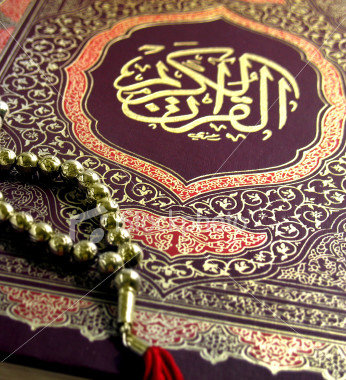Posts Tagged ‘Stress’
Steps to Attain Internal Satisfaction!

The Quran guidance to inner peace 5 steps to attain inner peace
1-What is inner peace?
The topic of inner peace addresses a universal need. There is nobody on this planet that does not desire inner peace. It is not a desire that is new to our time. Rather, it is something that everybody has been searching for throughout the ages, regardless of color, creed, religion, race, nationality, age, sex, wealth, ability or technological advancement.
People have taken a variety of different paths in trying to achieve inner peace, some through accumulating material possessions and wealth, others through drugs; some through music, others through meditation; some through their husbands and wives, others through their careers and some through their children’s achievements or technological advancement and modernization. And the list goes on.
So the reality is that all of these have not brought inner peace and tranquility. Rather in spite of the comforts that modernization has brought us, we are further away from inner peace than our ancestors were.
Inner peace is for the most part of our lives very elusive; we never seem to get our hands on it.
Many of us mistake personal pleasures for inner peace; we achieve elements of pleasure from a variety of things, be it wealth, sexual relations or other than that. But these do not last, they come and go. Yes we have personal pleasures from time to time and we are pleased with various things from time to time, but this is not inner peace.
True inner peace is a sense of stability and contentment which carries us through all the trials and difficulties of life.
2- Life is full of struggles
Allah says:
“Verily, I have created man in toil (struggle).” (Quran 90:4)
This is the nature of our lives; we are in struggle, ups and downs, times of difficulties and times of ease.
It is a life full of tests as God says:
“And certainly, We shall test you with something of fear, hunger, loss of wealth, lives and fruits, but give glad tidings to the patient ones” (Quran 2:155)
Obviously there are some obstacles which prevent us from attaining peace. So first we have to identify the obstacles in our lives which prevent us from achieving inner peace and develop a strategy to remove them.
If we look at the obstacles in life, we can put them under a variety of headings: personal problems, family issues, financial dilemmas, work pressures and spiritual confusion. And there are many issues under these headings.
3- Obstacles that are beyond our control
We have to be able to distinguish which obstacles are within our control and which ones are beyond our control. What we perceive as obstacles beyond our control, the reality is that they are not. Things like skin color, height or physical conditions are the things that God has destined for us in our lives, they are not really obstacles, but we have misinterpreted them as being such.
These are all things that were and are beyond our control. We did not choose which family to be born in to; we did not choose which body for our spirit to be blown into – this is not our choice. So whenever we are confronted with these kinds of ‘obstacles’ then we just have to be patient with them and realize that, in fact, they are not really obstacles. God told us:
“…and it may be that you dislike a thing which is good for you and that you like a thing which is bad for you. God knows but you do not know.” (Quran 2:216)
So the obstacles that are beyond our control, we may dislike them and we may want to change them (and some actually spend a lot of money trying to do just that).
Inner peace can only be achieved if the obstacles that are beyond our control are accepted by us patiently as part of God’s destiny.
Know that whatever happens which we had or have no control over, then God has put in it some good, whether or not we are able to grasp what is good in it; the good is still there. So we accept it knowing that God does not put a burden on humans that they are not able to bear.
God says:
“On no soul does Allah place a burden greater than it can bear. It gets every good that it earns, and it suffers every ill that it earns……” (Quran 2:286)
4- Obstacles that we can change:
To remove these obstacles we have to focus mostly on self-change and this is because God says:
“Verily! God will not change the good condition of a people as long as they do not change their state of good within themselves…” (Quran 13:11)
Anger for example, is an area which we have control over. We can even develop patience, unlike the common idea that some people are just born patient.
A man came to the Prophet, peace be upon him, and asked what he needed to do to get to Paradise, so the Prophet(sal Allahu alahi wa salam) told him:
“Do not get angry.” (Saheeh Al-Bukhari)
So we have to focus mostly on self-change and develop better character
The Prophet(sal Allahu alahi wa salam) gave us advice on how to deal with the material world by saying:
“Do not look to those above you who are more fortunate, instead, look to those below you or less fortunate…”
This is because no matter what our situation is, there are always those who are worse off than us. This should be our general strategy with regards to the material life. We seem to be obsessed with it; gaining all we can in this world seems to be the main point that most of us focus our energies towards. So if one must do this then they should not let it affect their inner peace.
While dealing with the material world we should not keep focusing on those who are better off than us otherwise we will never be satisfied with what we have.
The Prophet(sal Allahu alahi wa salam) said:
“If you give the son of Adam a valley of gold he would want another one.” (Saheeh Muslim)
We cannot achieve satisfaction in the material world if we are chasing after it in such a way; rather, we should look to those who are less fortunate, this way we will remember the gifts, benefits and mercy that God has bestowed upon us with regards to our own wealth, no matter how little it may seem.
5-Accepting Allah in our hearts
There is another saying of the Prophet Muhammad(sal Allahu alahi wa salam) which helps us in the realm of the material world to put our affairs in their proper perspective. The Prophet(sal Allahu alahi wa salam) stated:
“Whoever makes this world his only goal, God will confuse his affairs and place poverty before his eyes and he will be able to attain nothing from this world except for what God has already written for him…”
“Whoever sets the Hereafter as his goal, God gathers his affairs for him, gives him richness of (faith in) the heart and the world will come to him grudgingly and submissively.” (Ibn Maajah, Ibn Hibbaan)
Such a person attains richness of the heart. Richness is not about having a lot of wealth, but richness is having wealth of the heart, and what is wealth of the heart? It is contentment, and this is where the peace comes from, when a person submits themselves to God, and this is Islam.
The inner peace is accepting Islam in our hearts and living by the principles of Islam. So God will put richness in a person’s heart and this world will come to him submissively, on its knees and humbled. Such a person will not have to chase it.
If we do this we can achieve inner peace, and Allah informed us of this in the Quran, a precise step to take in order to attain inner peace, and Allah says:
“Verily, in the remembrance of Allah do hearts find rest.” (Quran 13:28)
In summary, the search for inner peace involves recognizing the problems that we have in our lives, recognizing our obstacles, recognizing that inner peace will only come when we identify those obstacles and understand which of them we can change and that we focus on those obstacles we can change, the ones which are related to our self.
If we change our self then Allah will change the world around us and give us the means to deal with the world around us. Even though the world is in turmoil God gives us inner peace within it.
Whatever happens (beyond our control) we know that it is Allah’s destiny and that it is Allah’s trial and we know that ultimately it is for our good and has good in it. God created us in this world and the world as a means to attain Paradise and the trials of this world are for our own spiritual growth.
If we can accept all this, accepting God in our hearts then we can find inner peace.!


 [post this Article on your facebook wall,and share with friends.click above “Share” button …]
[post this Article on your facebook wall,and share with friends.click above “Share” button …]


[where ever you post,please add source link.either in website or even in facebook NOTE…please….spread the link of site..]

![]() Note:I’d love to see who visit my website,your views about website. Click here to leave your feedback.
Note:I’d love to see who visit my website,your views about website. Click here to leave your feedback.

- In: All | Allah الله | Islam | Quran | Satan/Shaitan/Jinn | Special Islamic Reminders | Tricks of Satan
- 4 Comments
8 things you can do to counteract the effects of stress

1. Increase dhikr (remembrance of Allah):
“Those who believe, and whose hearts find satisfaction in the remembrance of Allah: for without doubt in the remembrance of Allah do hearts find satisfaction (Qur’an, 13:28).”
2. Increase prayers:
“O you who believe! Seek assistance through patience and prayer; surely, Allah is with the patient (Qur’an, 2:153).”
Regardless of the type of meditation, recent studies have verified the physiological effects of meditation. Most of those mediations consist in focusing on something, repeating some words and breathing (Greenberg, p.142, 143).
3. Perform ablutions: The most important component of relaxation is what Hans Loehr calls “the rituals of success.” These rituals may be as simple as making ablution; yet, they must be performed properly for it is not enough to pass water on the body parts – those parts must be massed.
4. Ask for forgiveness :
Even if a person has not done anything wrong, he must insure the forgiveness of Allah. “Then I said, ‘Ask forgiveness of your Lord; surely, He is the most Forgiving'” (Qur’an, 71:10).
5. Recite the Qur’an: The Prophet (SAW) said,
“… Qur’an is a remedy for illnesses of the mind” (Bukhari).
“The echo of sound has a medical effect and is now widely utilized,” says Dr. Greenberg. “The recitation of or listening to the Qur’an has an effect on the body, the heart and the mind! It is said that the letter Alif echoes to the heart and the letter Ya’ to the pineal gland in the brain.
Dr Ahmed El Kadi of Akber Clinic (Panama City, FL) conducted and published the effects of listening to Qur’anic recitation on physiological parameters ( i.e., the heart, blood pressure, and muscle tension), and reported improvement in all factors, irrespective of whether the listener was a Muslim or a non-Muslim, Arab or non-Arab. Obviously, it can be postulated that those who understand and enjoy the recitation with a belief in it will get maximum benefits,” writes Dr Athar.
6. Make the hereafter one’s main concern: “Whoever has the hereafter as his main concern, Allah will fill his heart with a feeling of richness and independence; he will be focused and feel content, and this world will come to him in spite of it. Whoever has this world as his main concern, Allah will cause him to feel constant fear of poverty; he will be distracted and unfocused, and he will have nothing of this world except what was already predestined for him,” said the Prophet (SAW). One of the greatest causes of stress is money – how to pay the loans, whether one’s job will be lost, what will happen to the family if the father dies, etc.
7. Think positively: Muslims should forget about the bad things of the past and think of good things, always having hope that he can be better. Trying to change the past is a foolish and crazy waste of time, “for saying ‘if only…’opens the way to Shaytan” said the Prophet (SAW). The Prophet (SAW) also said, ” Know that victory (achievement) comes through patience, and that ease comes through hardship.” Muslims understand that there’s no reason for panic in the case of crisis – no reason to be distressed or worried for we know that after hardship come ease!
8. Do not waste time on thoughts of fear or stress: “The search of time is one of the most frequent causes of stress” (Seyle, p.102). Laziness is the mother of all evils, and the Prophet (SAW) used to seek refuge in Allah from it. Understanding that this life is short and time precious, Muslims should try to work hard and pursue worthy knowledge



[post this Article on your facebook wall,and share with friends.click above “Share” button …]
![]() Note:I’d love to see who visit my website,your views about website. Click here to leave your feedback.
Note:I’d love to see who visit my website,your views about website. Click here to leave your feedback.

[where ever you post,please add source link.either in website or even in facebook NOTE…please.]
- In: All | Allah الله | Hadith/Sunnah | Islam
- 14 Comments

25 Ways to Deal with Stress and Anxiety

Stress is life. Stress is anything that causes mental, physical, or spiritual tension. There is no running away from it. All that matters is how you deal with it. This article does not deal with the factors of stress, anxiety, and depression, nor is it a clinical advice. If you feel depressed, you are not alone. It has been estimated that 75 to 90 percent of all visits to primary care physicians in America are for stress-related problems. This is why it is wise to consult a doctor if you are having physical symptoms of stress. However, here are some tips that can help from a spiritual perspective. Please send us your feedback so that we can improve this article Insha Allah.
Torture. Beatings. Loss of property. The death of loved ones. These were just some of the enormous challenges the Muslims of Makkah faced in the seventh century following their acceptance of Islam in fiercely tribal and polytheistic Makkah.
Detention. Harassment. Beatings. Discrimination. Loss of Job. Profiling. Hate Crimes. Constant media attention. Surveillance. These are just some of the challenges Muslims in America today face, post-9/11. Like our predecessors in Makkah, we have begun to face great stress, anxiety, and pressure, more than ever in our recent history on this continent, although Muslims who were brought here as slaves faced worse than what we can even imagine.
1. Ask Him. He Listens: Dua
Turn each anxiety, each fear and each concern into a Dua (supplication). Look at it as another reason to submit to God and be in Sajdah (prostration), during which you are closest to Allah. God listens and already knows what is in your heart, but He wants you to ask Him for what you want. The Prophet said: Allah is angry with those who do not ask Him for anything (Tirmidhi).
The Prophet once said that in prayer, he would find rest and relief (Nasai). He would also regularly ask for God’s forgiveness and remain in prostration during prayer praising God (Tasbeeh) and asking for His forgiveness (Bukhari).
Allah wants you to be specific. The Prophet advised us to ask Allah for exactly what we want instead of making vague Duas. Dua is the essence of worship (the Prophet as quoted in Tirmidhi).
“Call on your Lord with humility and in private: for Allah loveth not those who trespass beyond bounds. Do not make mischief on the earth, after it hath been set in order, but call on Him with fear. And longing (in your hearts): for the mercy of Allah is (always) near to those who do good” (Quran 7:55-56).
2. Tie your Camel: Do your Part
One day Prophet Muhammad, peace and blessings be upon him, noticed a Bedouin leaving his camel without tying it. He asked the Bedouin, “Why don’t you tie down your camel?” The Bedouin answered, “I put my trust in Allah.” The Prophet then said, “Tie your camel first, then put your trust in Allah” (Tirmidhi).
Muslims must never become fatalistic. Although we know only Allah is in control and that He has decreed all things, we are each responsible for making the right choices and doing the right thing in all situations of our lives. We must take action (link to planning articles on SV). We must work to alleviate the hardships we, our families and our communities face.
Ask yourself the following questions if you are worried about the state of the world: are you part of the peace movement? Is your Masjid part of the peace movement? Are you part of an interfaith group with an agenda of peace and justice? Are you working with a group fighting discrimination? If your answer is no, it is time that you sat down to plan your share of time and money in finding solutions to the problems you face. “Verily Allah does not change men’s condition unless they change their inner selves” (Quran 13: 11).
Turn each worry into a Dua and each Dua into an action plan. That will show your commitment to your request and will focus your energy in the right direction.
3.Remember that human responsibility is limited
While we need to carry out our duty to the best of our abilities, always remember that you don’t control the outcome of events. Even the Prophets did not control the outcome of their efforts. Some were successful, others were not. Once you have done your duty, leave the results to Allah. Regardless of the results of your efforts, you will be rewarded for the part you have played.
However, never underestimate your abilities. Understand the concept of Barakah (blessings from Allah) and remember that Allah can and Insha Allah will expand them if you are sincerely exerting your energies for the right path.
4.Leave the world behind you five times a day
Use the five daily prayers as a means to become more Hereafter-oriented and less attached to this temporary world. Start distancing yourself as soon as you hear Adhan, the call to prayer. When you perform Wudu, keep repeating Shahada, the declaration of faith, as water drops slip down your face, hands, arms, and hair. When you stand ready to pray, mentally prepare yourself to leave this world and all of its worries and stresses behind you.
Of course, Shaytan will try to distract you during prayer. But whenever this happens, go back and remember Allah. The more you return, the more Allah will reward you for it. Also, make sure your Sajdas (prostrations) are talking Sajdas, in which you are really connecting to God and seeking His Mercy, praising Him, and asking His forgiveness.
5.Seek help through Sabr
Seek help through Sabr and Salat (Quran 2:45). This instruction from Allah provides us with two critical tools that can ease our worries and pain. Patience and prayer are two oft-neglected stressbusters. Sabr is often translated as patience but it is not just that. It includes self-control, perseverance, endurance, and a focussed struggle to achieve one’s goal. Unlike patience, which implies resignation, the concept of Sabr includes a duty to remain steadfast to achieve your goals despite all odds.
Being patient gives us control in situations where we feel we have little or no control. ‘We cannot control what happens to us but we can control our reaction to our circumstances’ is the mantra of many modern-day self-help books. Patience helps us keep our mind and attitude towards our difficulties in check.
6.Excuse Me! You are Not Running the World, He is.
It is important to remind ourselves that we don’t control all the variables in the world. God does. He is the Wise, the All-Knowing. Sometimes our limited human faculties are not able to comprehend His wisdom behind what happens to us and to others, but knowing that He is in control and that as human beings we submit to His Will, enriches our humanity and enhances our obedience (Uboodiah in Arabic) towards him. Read the story of the encounter of Moses with the mysteries behind God’s decision (Quran: 18:60-82). Familiarize yourself with God’s 99 Names, which are also known as His Attributes. It is a powerful way of knowing Him.
“God-there is no deity save Him, the Ever-Living, the Self-Subsistent Fount of All being. Neither slumber overtakes Him, nor sleep. His is all that is in the heavens and all that is on earth. Who is there that could intercede with Him, unless it be by His leave? He knows all that lies open before men and all that is hidden from them, whereas they cannot attain to aught of His knowledge save that which He wills them to attain. His eternal power overspreads the heavens and the earth, and their upholding wearies Him not. And He alone is truly exalted, tremendous.” (Quran 2:255).
The Prophet recommended reading this verse, known as Ayat al kursi, after each prayer, Allah’s peace and blessings be upon him. Once Ali, may Allah be pleased with him, approached the Prophet during a difficult time and he found the Prophet in Sajda, where he kept repeating “Ya Hayy Ya Qayyum”, words which are part of this verse.
7.Birds Don’t Carry their Food
Allah is al Razzaq (the Provider). “How many are the creatures that carry not their own sustenance? It is Allah Who feeds them and you, for He hears and knows all things (Quran 29:60).”
By reminding yourself that He is the Provider, you will remember that getting a job or providing for your family in these economically and politically challenging times, when Muslims are often the last to be hired and the first to be fired, is in God’s Hands, not yours. As Allah says in the Quran:
“And He provides for him from (sources) he never could imagine. And if anyone puts his trust in Allah, sufficient is (Allah) for him. For Allah will surely accomplish His purpose. Verily, for all things has Allah appointed a due proportion (Quran 65:3).
8.God controls Life and Death
If you fear for your physical safety and security, remember that only Allah gives life and takes it back and, that He has appointed the time for it. No one can harm you except if Allah wills. As He says in the Quran:
“Wherever you are, death will find you out, even if you are in towers built up strong and high!” (Quran 4:78).
9. Remember that life is short
It’s easy to get caught up in our own stress and anxiety. However, if we remember that our life is short and temporary, and that the everlasting life is in the Hereafter, this will put our worries in perspective.
This belief in the transitory nature of the life of this world reminds us that whatever difficulties, trials, anxieties, and grief we suffer in this world are, Insha Allah, something we will only experience for a short period of time. And more importantly, if we handle these tests with patience, Allah will reward us for it.
10.Do Zikr, Allah, Allah!
“… without doubt in the remembrance (Zikr) of Allah do hearts find tranquility” (Quran 13:28).
If you commute, use your time in Zikr. Pick any Tasbeeh and do that instead of listening to the radio or reading the newspaper. Maybe you can divide it up between Zikr and planning. Personally, I recite the Tasbeeh of “Subhana Allahe wa be hamdihi, subhan Allahil Azeem” 100 times as I drive. The Prophet taught us these two short phrases which are easy to say but will weigh heavy on our scale of good deeds in the Hereafter.
When your heart feels heavy with stress or grief, remember Allah and surround yourself with His Zikr. Zikr refers to all forms of the remembrance of Allah, including Salat, Tasbeeh, Tahmeed, Tahleel, making supplication (Dua), and reading Quran.
“And your Lord says: ‘Call on Me; I will answer your (prayer)…” (Quran 40:60)
By remembering Allah in the way He has taught us to, we are more likely to gain acceptance of our prayers and His Mercy in times of difficulty. We are communicating with the only One Who not only Hears and Knows all, but Who can change our situation and give us the patience to deal with our difficulties.
“Remember Me, and I shall remember you; be grateful to Me, and deny Me not” (Quran 2:152).
11.Relying on Allah: Tawakkul
When you awaken in the morning, thank Allah for giving you life after that short death called sleep. When you step out of your home, say ‘in Your Name Allah, I put my trust in Allah, and there is no power or force except with Allah’ (Bismillahi Tawakal to al Allah wa la hawla wa la quwwata illa billah). At night, remember Allah, with His praises on your lips.
Once you have established a plan you intend to follow through on to deal with a specific issue or problem in your life, put your trust in the most Wise and the All-Knowing.
“When you have taken a decision, put your trust in Allah” (Quran 3: 159).
Rely on Allah by constantly remembering Him throughout your day. When you lay down to sleep, remember that sleep is death. That is why one of the recommended supplications before going to sleep is “with Your (Allah’s) Name I die and become alive”.
12.Connect with other human beings
You are not alone. Muslims are not alone. We are not suffering in silence. There are millions of good people who are not Muslim with beautiful hearts and minds. These are people who have supported us, individually and collectively, post-9/11, by checking up on us and making sure we are safe. These are individuals and organizations who have spoken up in defense of Muslims as we endured harassment and discrimination.
We must think of them, talk to them, connect with them, and pray for them. Through our connections, we will break the chain of isolation that leads to depression and anxiety.
13.Compare your dining table with that of those who don’t have as much as you do
The Prophet said: Whenever you see someone better than you in wealth, face or figure, you should look at someone who is inferior to you in these respects (so that you may thank Allah for His blessings) (Bukhari, Muslim).
Next time you sit down to eat, eye the table carefully. Check out the selection of food, the quality, the taste, the quantity, and then think of the millions of others who don’t have even half as much. The Prophet’s Hadith reminds us of this so that we can appreciate and thank God for all that we have.
Also remember that the Prophet only encouraged us to compare ourselves to others in two respects: in our Islamic knowledge and level of belief in God (Deen). In these two areas, we should compare ourselves with those who have more than what we do.
14.Say it Loud: Allahu Akbar, Allahu Akbar: Takbirat & Adhan
Find a corner of a lake, go out in the wilderness, or even stand on your lawn at your home and call the Adhan with your heart. While driving, instead of listening to the same news over and over again, say Allahu Akbar as loudly as you can or as softly as you want, based on your mood. Year ago, I remember calling Adhan on a Lake Michigan shore in Chicago after sunset as the water gushed against my knees. I was calling it for myself. There was no one else accept the waves after waves of water with their symphony. It was relaxing and meaningful. Allahu Akbar, Allahu Akbar.
15.Pray in congregation (Jamat)
Pray with other people instead of alone. If you can’t pray all five prayers in congregation, at least find one or two prayers you can pray with others. If you are away, establish Jamat in your own family. During the Prophet’s time, even though the Muslims endured great persecution, including physical beatings, they would sometimes meet on the side of a mountain or valley and tried to pray together. This is a great morale booster.
16. How is your Imam’s Dua?
Does the Imam at your local mosque make Dua silently or out loud? Ask him to supplicate with the whole congregation. Suggest Duas for him to make. Ask him to make Dua for other people.
17.Work for the Unity of Muslims
Bringing Muslims together will not only help the Muslims, but it will also encourage you to focus your energies on something constructive versus zeroing in on and consistently fretting about difficulties you are going through.
Invite Muslims from other ethnic groups to your functions. Visit Masjids other than yours in your city. When you meet a Muslim leader, after thanking him for his efforts, ask him what he is doing for Muslim unity. Ask Imams to make Dua for this. These are just small ways you can help yourself and the Muslim community.
18.Sleep the way the Prophet slept
End your day on a positive note. Make Wudu, then think of your day. Thank Allah for all the good things you accomplished, like Zikr and Salat. Ask yourself what you did today to bring humanity together and what you did to help Muslims become servants of humanity. For everything positive, say Alhamdu lillah (Praise be to Allah). For everything negative say Astaghfirullah wa atoobo ilayk (I seek Allah’s forgiveness and I turn to You [Allah]). Recite the last two chapters of the Quran, thinking and praying as you turn on your right side with your hand below your right cheek, the way the Prophet used to sleep. Then close your day with the name of Allah on your tongue. Insha Allah, you will have a good, restful night.
19.Begin the Day on a Positive Note
Get up early. Get up thanking God that He has given you another day. Alhamdu lillahil lazi ahyana bada ma amatana, wa ilaihin Nushoor (Praise be to Allah Who gave us life after death and unto Him will be the return). Invest in an audio tape driven alarm clock so you can get up to the melody of the Quran. Or Let Dawud Wharnsby’s joyful notes put you in a good mood. Sing along if you like. Develop your to do list for the day if you didn’t do it the night before. Begin with the name of Allah, with Whose name nothing in the heavens or the earth can hurt you. He is the Highest and the Greatest. (Bismillahillazi la yazurru maa ismihi shaiun fil arze wa la fis samae, wahuwal Alee ul Azeem). The Prophet used to say this after every Fajr and Maghrib prayers.
20.Avoid Media Overexposure: Switch from News to Books
Don’t spend too much time checking out the news on the radio, television or internet. Spend more time reading good books and journals. When you listen to the persistent barrage of bad news, especially relating to Muslims nowadays, you feel not only depressed, but powerless. Cut down media time to reduce your stress and anxiety. It’s important to know what’s going on but not to an extent that it ruins your day or your mood.
21.Pray for Others to Heal Yourself.
The Prophet was always concerned about other people, Muslims and non-Muslims, and would regularly pray for them. Praying for others connects you with them and helps you understand their suffering. This in itself has a healing component to it. The Prophet has said that praying for someone who is not present increases love.
22.Make the Quran your Partner
Reading and listening to the Quran will help refresh our hearts and our minds. Recite it out loud or in a low voice. Listen to it in the car. When you are praying Nafl or extra prayers, pick it up and use it to recite portions of the Quran you are not as familiar with. Connecting to the Quran means connecting to God. Let it be a means to heal your heart of stress and worries. Invest in different recordings of the Quran and their translations.
“O humanity! There has come to you a direction from your Lord and a cure for all [the ills] in men’s hearts – and for those who believe, a Guidance and a Mercy” (Quran 10:57).
23.Be thankful to Allah
“If you are grateful, I will give you more” (Quran 14:7).
Counting our blessings helps us not only be grateful for what we have, but it also reminds us that we are so much better off than millions of others, whether that is in terms of our health, family, financial situation, or other aspects of our life. And being grateful for all we have helps us maintain a positive attitude in the face of worries and challenges we are facing almost daily.
24.Ideals: One step at a time
Ideals are wonderful things to pursue. But do that gradually. Think, prioritize, plan, and move forward. One step at a time.
25.Efforts not Results Count in the Eyes of Allah
Our success depends on our sincere efforts to the best of our abilities. It is the mercy of Allah that He does not demand results, Alhamdu lillah. He is happy if He finds us making our best sincere effort. Thank you Allah!
Abdul Malik Mujahid
JazakAllah khair for reading,pls share with source back link,
King
slave of Allah SWT


 [post this Article on your facebook wall,and share with friends.click above “Share” button …]
[post this Article on your facebook wall,and share with friends.click above “Share” button …]


[where ever you post,please add source link.either in website or even in facebook NOTE…please….spread the link of site..]

![]() Note:I’d love to see who visit my website,your views about website. Click here to leave your feedback.
Note:I’d love to see who visit my website,your views about website. Click here to leave your feedback.

- In: All | Allah الله | Dua --- Supplication ! | Hadith/Sunnah | Islam | Quran
- 11 Comments

Concerning His remembrance, Allah, the All-Glorious, says:
Verily, in the remembrance of Allah do hearts find rest. (Qur’an 13: 28)
Therefore remember me [by praying, glorifying etc.] and I will remember you…
(Qur’an 2: 152)
And the men and the women who remember Allah much with their hearts and tongues, Allah has prepared for them. Forgiveness and a Great reward [i.e. Paradise]. (Qur’an 33: 35)
You who believe! Remember Allah with much remembrance. And glorify His Praises morning and afternoon [the early morning (fajr) and ASR prayers. (Qur ‘an 33: 41-42)
You who believe! Let not your properties or your children divert you from the remembrance of Allah. (Qur ‘an 63: 9)
And remember your Lord when you forget… (Qur’an 18: 24)
And glory’s’ the Praises of your Lord when you get up from sleep. And in the night-time also, glorify His Praises, -and at the setting of the stars. (Qur ‘an 52: 48-49)
You who believe! When you meet [an enemy] force, take a firm stand against them and remember the Name of Allah much [both with tongue and mind], so that you may be successful. (Qur’an 8: 45)
In an authentic hadith, the Prophet (bpuh) said:
“The example of one who remembers his Lord in relation to one who does not remember his Lord is that of the living and the dead.”
The Prophet (Blessings and Peace be upon him) also said:
“The mufarridoon outstrip others.” His Companions asked. “Who are the mufarridoon, O’ Messenger of Allah.” He said, “The men who remember Allah often and the women who remember Allah often.”
And in another authentic hadith, the Prophet (bpuh) said:
“Shall I not inform you of the best of deeds, and the purest of them with your Lord? The deed which is better for you than spending gold and silver (for a good cause). And which is better for you than to meet your enemy. And you cut their throats and they cut yours?” They said, “Yes_ O’ Messenger of Allah.” He said, “The remembrance of Allah.”
The following is an authentic hadith:
“A man came to the Prophet and said, Messenger of Allah, the commandments of Islam have become too much for me, and I am old in age; so inform of something that I can adhere to.’ He said, `That your tongue (continually) remains moist with the remembrance of Allah.”














































 Oh Allah,Please Forgive me
Oh Allah,Please Forgive me Ex-Christians-Now Muslim,Alhamdulillah
Ex-Christians-Now Muslim,Alhamdulillah I Love My Prophet Muhammad s.a.w
I Love My Prophet Muhammad s.a.w
















![Fake Grave of Prophet Muhammad [pbuh]](https://islamgreatreligion.files.wordpress.com/2009/07/prophet_muhammad_pbuh_tomb4.jpg)


















Recent Comments